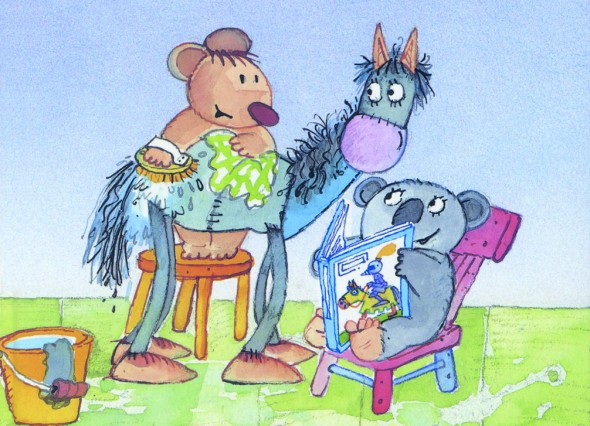Archive for September, 1988
Summer child
Issue 3/1988 | Archives online, Fiction, Prose
A short story from Resa med lätt bagage (‘Travelling light’, 1987). Introduction by Marianne Bargum
From the very beginning it was quite clear no one at Backen liked him, a thin gloomy child of eleven; he looked hungry somehow. The boy ought to have inspired a natural protective tenderness, but he didn’t at all. To some extent, it was his way of looking at them, or rather of observing them, a suspicious, penetrating look, anything but childish. And when he had finished looking, he commented in his own precocious way, and my goodness, what that child could wring out of himself.
It would have been easier to ignore if Elis had come from a poor home, but he hadn’t. His clothes and suitcase were sheer luxury, and his father’s car had dropped him off at the ferry. It had all been arranged over the phone. The Fredriksons had taken on a summer child out of the goodness of their hearts, and naturally for some compensation. Axel and Hanna had talked about it for a long time, about how town children needed fresh air and trees and water and healthy food. They had said all the usual things, until they had all been convinced that only one thing was left in order to do the right thing and feel at ease. Despite the fact that all the June work was upon them, many of the summer visitors’ boats were still on the slips, and the overhaul of some not even completed. More…
‘ware bears!
Issue 3/1988 | Archives online, Children's books, Fiction

Illustration: Jukka Lemmetty
Urpo and Turpo are a pair of teddy bears. Their family – mother, father and three children – cannot imagine who it is that makes such a mess; the bears live their own absorbing lives in house. Hannele Huovi’s text and Jukka Lemmetty’s illustrations describe the bears’ antics in a way that appeals to the sense of humour of readers of all ages.
In the green house an ordinary family are living a perfectly ordinary life. There’s father, mother, The Big Daughter, The Son, and also The Baby as well. Mother keeps running back and forth all day long shouting, ‘Goodness gracious! Who’s responsible for this?’ For very funny things keep going on in the house. Who on earth is it – always getting up to some sort of hanky-panky?
Father harrumphs and says to The Big Daughter:
‘It was you, wasn’t it?’ But The Big Daughter shakes her head. Father turns to The Son:
‘So it must have been you, then?’ But the son shakes his head. No use asking The Baby. He shakes his head anyway, because he’s always imitating the others. Father and mother are completely stumped. More…
The rocket
Issue 3/1988 | Archives online, Fiction, Prose
Raketen (‘The rocket’), a novella from the collection Den segrande Eros (‘Eros triumphant’), 1912. Introduction by George C. Schoolfield
The sun shone straight in through the veranda’s little windows that made the whole ‘villa’ resemble a hothouse. With a sigh, Elsa let the morning paper fall to the floor; she had gotten halfway through the classified ads: ‘Three lads wish to correspond with likeminded lasses.’ ‘If Mr Söders-m does not fetch his effects, left as bond for unpaid rent, within a week, they will be regarded as our property, and his name will be published in toto.’ Now she could stand no more. The air seemed to come from a bakeoven. Listlessly, she watched two flies as they flicked the ceiling paper in their humming dance of love. It seemed as though knives were being thrust into the back of her head; that was the way her sick headaches began. A long walk might stop it, she knew, but she felt too tired.
At last, she was able to make herself get up and open the door for some fresh air. But with the air she got a powerful smell of roasting pork from the baker’s villa; the yells of the children playing cops and robbers up on the rock were doubled in force. A nasty stabbing sensation began in Elsa ears. And so she decided to take a walk after all, but only to the steamboat jetty. More…
In the north
Issue 3/1988 | Archives online, Fiction, Prose
A short story from Luvaton elämä (‘Forbidden life’, 1987). Introduction by Tero Liukkonen
I
I went up north in a sleeping car. It was a relief to see that even in Tampere there was a sign on the car saying ‘Kemijärvi’. That meant I could sleep the whole way. I had the lower berth; a couple more like me were sleeping in the same compartment – just ordinary women. I was nevertheless silent and reserved, so that neither of them would want to make me into a travelling companion. And they did leave me in peace.
I read for a bit, till I began to feel more at home, and settled down to sleep with my woollen socks on. I deliberately went almost to sleep while not wanting to drop off completely; and I gradually reached a point where I didn’t know which direction the train was going in. That was liberating. It was all the same which direction we were going in. The motion of the train got through to my nerves and started releasing things. More…
